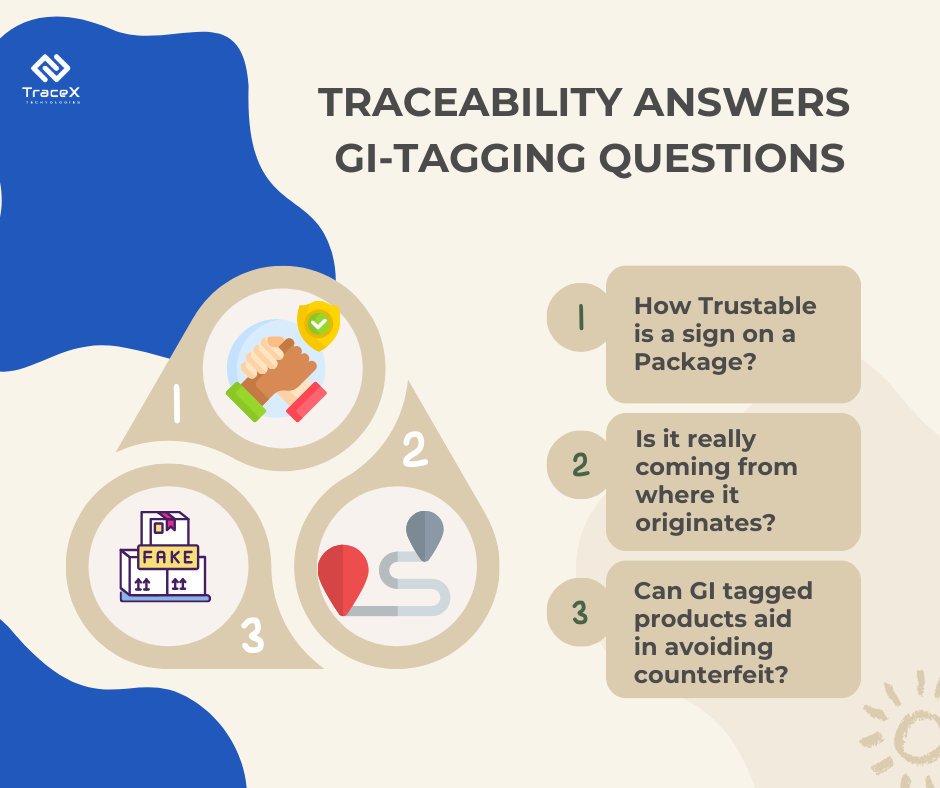Contact: +91 99725 24322 |
Menu
Menu
Quick summary: Explore the pivotal role of traceability in Geographical Indication (GI) products. Uncover how advanced traceability solutions, such as TraceX, contribute to preserving the authenticity, integrity, and economic value of GI treasures. Join us on a journey through the intricate landscapes of GI supply chains, showcasing the importance of transparent and technology-driven traceability in safeguarding the unique identities of region-specific products.

Traceability in GI products safeguards the authenticity, heritage, and distinct flavours of GI treasures. Traceability unveils the entire trajectory of a fruit’s sustainable harvesting and distribution, serving as a preventive measure against the misuse of Geographical Indication (GI) tags.
As of today, a total of 400 plus products are tagged as GI in our country.
This blog explores the essence of traceability, and why it is the linchpin in ensuring the integrity and trustworthiness of these exceptional and region-specific products. Dive into the realm of Geographical Indication (GI) products and uncover the pivotal role traceability plays in their story.
A product that is identified as coming from a particular geographic place, where the product’s features, reputation, or other attributes are mostly attributable to that location, is known as a Geographical Indication (GI) product. By prohibiting producers outside of the designated region from using the geographical term without authorization, this designation serves to preserve the product’s distinctiveness and quality. Champagne, Darjeeling tea, and Roquefort cheese are a few examples. The product gains value from having GI status, which also strengthens the bond between the product and its place of origin.
In India, Geographical Indications (GI) registration is administered by the Geographical Indications of Goods (Registration and Protection) Act of 1999.
A Geographical Indication (GI) is a distinctive designation permitted for use on products owing to their specific geographical origin or unique characteristics linked to the sourcing location. To qualify as a GI, this distinctive indicator must signify the product’s association with a particular location, which could range from a region or city to a more specific geographical area, rather than encompassing an entire country.
The capacity to monitor and follow the flow of goods, materials, or parts through different phases of manufacture, processing, and delivery within a supply chain is known as traceability.
It involves documenting and recording relevant information at each step, enabling the identification of the origin, handling, and destination of a product. Traceability is crucial for quality control, ensuring safety standards, and responding effectively to incidents like recalls. It enhances transparency, accountability, and consumer confidence by providing visibility into the entire lifecycle of a product.
GI tagging emerges as a potent tool to enhance food safety and quality, particularly within India’s vast unorganized food processing industry. It plays a crucial role in establishing a traceable and accountable food system, linking back to the original producer to verify authenticity. Products adorned with GI tags often originate from indigenous and traditional practices passed down through generations. These items possess unique qualities that attract a dedicated clientele both nationally and globally. The conferment of GI recognition, marked by a distinct label, provides consumers with an assurance of quality and authenticity. Simultaneously, it ensures a sustained livelihood for the communities involved in their production. Beyond quality assurance, this recognition and protection empower producers to uphold precision, authenticity, and the reputation on which these products were originally crafted.
Over the years, numerous products in India have been bestowed with Geographical Indication (GI) tags. Among the pioneers was Darjeeling Tea, receiving its GI tag in 2004. Subsequently, a diverse array of items, spanning agricultural produce, handicrafts, spices, and textiles, have been recognized with GI tags, highlighting their distinctiveness.
The capacity to track a product’s manufacturing, processing, and distribution back to its precise geographical origin is known as traceability in the context of Geographical Indications (GI). To guarantee authenticity and compliance with the distinctive qualities connected to a specific geographic area, it entails recording and confirming each step of the supply chain. By avoiding the fraudulent use of geographical indications, traceability in GI is crucial to protecting the integrity and reputation of products.
The maintenance of the distinctiveness of Geographical Indication (GI) products is greatly aided by traceability, which makes sure that all phases of manufacturing, processing, and distribution are recorded and independently verified. This careful monitoring aids in preventing unauthorized use of the geographical indicator and preserves the distinctive features and attributes connected to the designated region
One example of a famous Geographical Indication (GI) product is Parmigiano-Reggiano cheese from Italy. Its traceability practices involve recording the origin of milk, the specific production process in the designated region, and a unique stamp on each wheel that allows for easy identification. Another example is Scotch whisky from Scotland, which has strict traceability standards ensuring that every step of production, from barley cultivation to distillation and aging, adheres to the defined geographical criteria.

Geo-tagging the product not only ensures the fruit’s adherence to global standards but also fulfils a vital traceability requirement in food systems. Traceability provides a comprehensive account of the sustainable journey from harvesting to distribution, serving as a deterrent against the misuse of Geographical Indication (GI) tags. Furthermore, GI tags play a pivotal role in enhancing and fortifying existing certification systems in India, encompassing both natural and organic certifications.
Securing a Geographical Indication (GI) certification for a distinctive product is a complex process, requiring a country to substantiate the product’s unique value based on its origin. It’s crucial to articulate why the product from a specific location possesses unparalleled qualities that cannot be replicated elsewhere globally. After this assertion, other countries have the opportunity to challenge the claim.
Upon successful completion of this process and the acquisition of a GI certificate, the certified product can display the GI sign on its packaging. Traceability is a fundamental requirement for obtaining this certification, necessitating ongoing documentation of traceability data by producers.
In order for items bearing Geographical Indications (GIs) to comply with regulatory criteria, traceability is essential. Producers are able to ensure compliance with certain geographical criteria established in regional or international standards by documenting and verifying each step of the supply chain. Traceability ensures that production, processing, and distribution are transparently documented and auditable, which supports compliance with legal requirements and protects the validity of GI products, and facilitates regulatory enforcement.
Because traceability offers transparency and assurances about the origin, authenticity, and quality of items, it has a substantial impact on consumer perception. Customers are becoming more interested in the history of the products they purchase, and traceability meets this need. It strengthens authenticity claims, cultivates trust, and raises the perceived worth of goods. In the end, traceability increases customer trust and loyalty.
Transparent supply chains foster confidence by being upfront with information regarding the sourcing, manufacturing, and delivery of goods. This openness encourages moral behaviour, shows supply chain accountability, and empowers customers to make educated decisions. Businesses build trust, reassure customers about the validity of their products, and encourage customer loyalty by making their procedures transparent.
Unlock the secrets of building a robust consumer brand through traceability!
Discover how traceability can elevate your brand by fostering transparency, authenticity, and consumer trust.
Dive into our insightful blog
Traceability is the process of closely monitoring and recording the manufacture, processing, and delivery of products along the supply chain in order to guarantee quality control. The product’s integrity and consistency are preserved by the prompt detection and resolution of any deviations or problems made possible by this methodical monitoring. Traceability improves overall product quality and safety by facilitating quick response to quality issues, calming customers and maintaining the brand’s reputation.
Because traceability techniques make it possible to accurately track products along the supply chain, they act as a potent deterrent against fraud and counterfeiting. Ensuring the authenticity of commodities is facilitated by these procedures, which help detect and eliminate illegal or imitation products through accurate documentation at each level. This proactive strategy upholds brand reputation, safeguards consumers, and reinforces the overall integrity of the market by reducing the prevalence of fraudulent practices.
Because traceability offers an open account of a product’s path from local producers to consumers, it is essential for bolstering local economies. This visibility raises the market value of products associated with a particular area, supporting the expansion of regional enterprises. Armed with information about product provenance, consumers are more inclined to choose and support local businesses, so promoting the long-term viability and health of the local economy.
Products bearing the Geographical Indication (GI) designation strengthen local economies by highlighting and preserving the distinctive features of items connected to a particular area. Because it preserves traditional knowledge and encourages sustainable production methods, GI designation creates economic opportunities in addition to adding value to local products. This recognition enhances the visibility and marketability of local products, contributing to the socio-economic development of communities, preserving cultural heritage, and creating a sense of pride and identity among local producers.
Blockchain, RFID (Radio-Frequency Identification) tags, and barcode systems are among the technologies utilized in the traceability of Geographical Indication (GI) items. Real-time data is provided by barcodes and RFID tags, which make it possible to follow products at different points in the supply chain. The decentralized, unchangeable ledger provided by blockchain technology guarantees the accuracy and transparency of tracing data.
The application of blockchain technology to preserve the Geographical Indication (GI) designation of Scotch whisky is one noteworthy case study. Working with digital companies, the Scottish government put in place a blockchain-based system that tracks every step of the production process and verifies the legitimacy of every bottle. The Parmigiano-Reggiano Consortium’s effective use of RFID technology is another example.
TraceX blockchain traceability solutions play a pivotal role in addressing the challenges of introducing traceability in Geographical Indication (GI) products. The decentralized and transparent nature of blockchain technology offers unique advantages tailored to the intricacies of the GI sector.
Overall, TraceX acts as a catalyst for overcoming challenges in introducing traceability to GI products, promoting authenticity, transparency, and economic benefits for authorized GI producers and users.
Explore how TraceX technologies revolutionized the export journey for GI Tagged Nendran bananas with the Vegetable and Fruit Promotion Council of Kerala (VFPCK).
To sum up, traceability is an essential instrument for preserving the economic worth, quality, and validity of items bearing the Geographical Indication (GI) designation. It increases supply chain transparency, fosters customer confidence, and safeguards the distinctive qualities connected to particular geographic areas. Although there are difficulties, they may be solved with teamwork, uniform frameworks, and focused assistance, guaranteeing the effective deployment of traceability systems. Prioritizing traceability helps to sustain the expansion of GI products in the wider economy while also protecting local communities’ cultural identities as the global marketplace changes.
